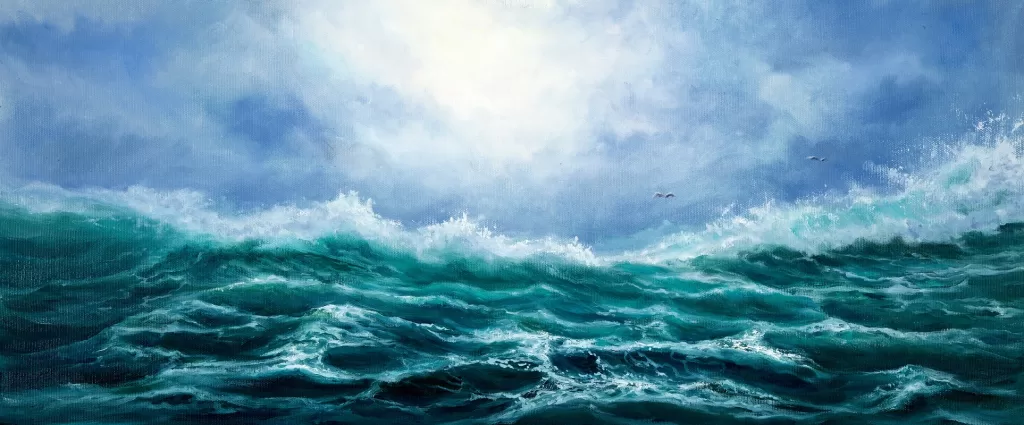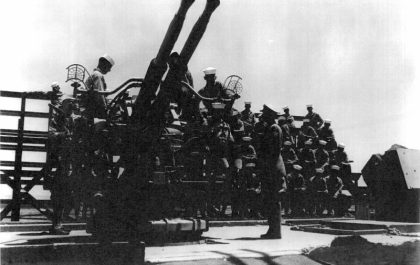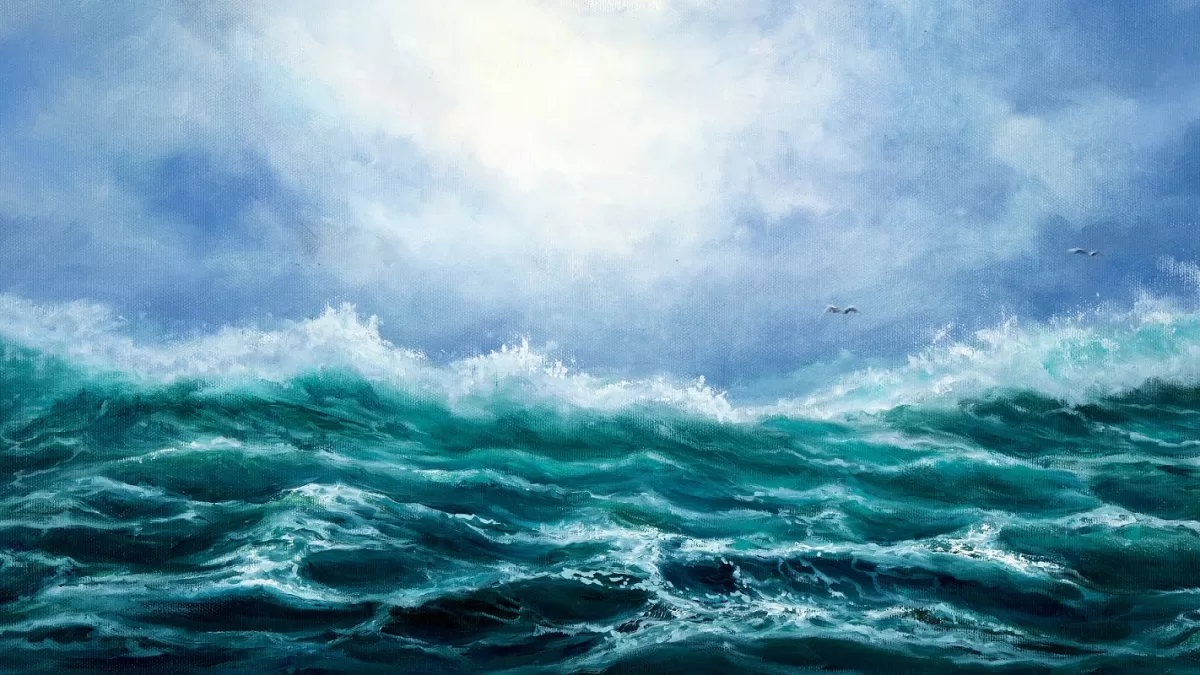
The Coastwatchers chronicles the adventures of James Ellis Anderson, a young boy from Illinois sent to live with his eccentric aunt in Malibu during WWII. In the tradition of fiction from that period, TNT is presenting this original story by TNT Editor Suzanne Guldimann in serial installments. The first chapter, which introduces James and his Aunt Maddie, debuted in our November 4, 2022 issue and is available online. Please join us, as we travel back in time to 1942.
It was soon evident that Jessie’s dream of a weekly newsletter was going to be too much work. “We’ll make the Coastwatchers a biweekly newspaper,” she announced. “That means every other week, not twice a week,” she added kindly, seeing my confusion. Kitty and I were both relieved. The long ride to and from school on the bus didn’t leave much time for homework or anything else, let alone writing a newsletter, and Jessie and I had got in the habit of getting off the bus two stops early so we could walk home with Kitty.
Kitty was always cheerful and helpful, and brave. Braver than anyone I ever knew before. She had to endure more than just the cold shoulder from the other kids in the class. She faced insults and taunts, kicks, and feet stuck out to trip her, but she never let it show that it upset her. Jessie, who was much taller and fiercer than her friend, elected herself as bodyguard. I helped as much as I could. That’s how we started getting out at her bus stop on the way home, so the three bigger kids who got out there too wouldn’t bully her.
I got to know Mr and Mrs Nakamura. Kitty’s mother didn’t speak much English, but her dad was born in America, and her sisters and brothers were just as American as anyone else. Kitty was the youngest, and her brothers and sisters were mostly grown up, but they were all really nice, and everyone helped on the farm. Even the sister who lived in town during the week and worked at a bank came home on the weekends to help.
Kitty had a lot of chores, but it wasn’t all work. Her parents encouraged her to draw and paint, and she and her brother Joe had a little white dog named Yuki who could do all kinds of tricks.
“We trained him ourselves,” Kitty said, proudly.
It was an extra two-mile walk home from Kitty’s place, but I didn’t mind. The walk gave us more time to plan the next issue of The Coastwatchers, and Jessie and I walked home from the Nakamura farm in the dusk talking about anything and everything, or just watching the first stars come out. It also gave us a chance to actually watch the coast. We would detour down to the beach before heading up the canyon to our homes. We got to know the Coast Guard men who patrolled that part of the beach. They were good guys. Two of them were from Illinois, just like me, and they’d never seen the ocean either, not until they enlisted and were sent to California. It was a lonely post. They were always happy to chat.
They were almost the only people we ever met on the beach that winter. It was two months into the war, and people were increasingly nervous that an invasion could come any day. There were stories of merchant ships being attacked right off the coast. One of them was torpedoed by a Japanese submarine right off of Los Angeles, just on the other side of the bay.
Barbed wire was going up all along the shore, Civil Defense volunteers were installing air raid sirens, and the Army was said to be building anti-aircraft guns on the bluffs above the beach. No one seemed to be entirely sure where the guns were going to be, but there were convoys of military trucks on the Coast Highway, and rumors that the entire Point Dume peninsula was being commandeered for an Army lookout.
The night before we were planning to print the second issue of The Malibu Coastwatcher, the air raid siren at the mouth of the canyon went off, shattering the pre-dawn silence. The cat and I leapt out of bed. I met Aunt Maddie in the hall. She didn’t know what was happening, either.
“Get dressed, James. Let’s go take a look,” she said.
Aunt Charlotte would have said, “get back into your room and don’t come out until I say so,” I thought, hastily tying my shoes and struggling into a jacket. Aunt Maddie wasn’t the type of person who hid from anything, and she was treating me like a person and not like a kid. I hurried.
It was cold. The wind was up and the stars were bright in a moonless sky, bright enough to see by, at least out in the open away from the trees. We met Mr Calzado by the corral.
“They’re saying the beach is under attack,” he told us. “But all I could see were some flares a little way off the coast.”
He led the way along the beach path. We walked silently, single-file, down the creek and under the highway. My heart was pounding so fast and loud I felt like everyone else must hear it, too.
There was a glow of fire in the bay. Something was burning. For a moment it looked like a miniature volcano: a column of smoke was illuminated from below by flames.
“It’s a fishing boat,” Mr Calzado exclaimed. “One of the big barges that take passengers out from the pier.”
A smaller Coast Guard boat was attempting to come alongside the burning wreck, but it was being tossed by the rough surf. We could hear cries that carried surprisingly well across the water, despite the wind.
The two Coast Guard men assigned to our stretch of beach that night were standing at the edge of the water. I knew the ensign. His name was Ezra Wright and he was one of the men from Illinois. He had a pair of binoculars. The other man had a radio transceiver.
“You shouldn’t be here,” the second man was starting to say, but Aunt Maddie pointed past him.
“Someone is in the water,” she said, pointing. The sky was lighter now, and we could see a dark shape just past the surf break.
Without a word, Ensign Wright handed his binoculars to this companion and plunged into the water.
The four of us watched breathlessly as he swam out and began towing the limp form toward the shore. It was slow going. The waves were big, and the shore break was powerful and turbulent. Mr Calzado pulled off his boots and waded out to meet the rescuer. Aunt Maddie and the second Coast Guard man were right behind him. It took their combined effort to get the other two safely to shore.
There was a flurry of activity. The victim was carried out of the reach of the waves, and first aid was administered. Chest compressions, and bandages to stop the bleeding from a deep gash in the victim’s leg, once he was breathing again and not coughing up sea water. The man was conscious by the time more help arrived. He told us his name was Bill Hughes. He was a member of the barge’s crew, the father of three children—including one who was serving in the Navy, and a daughter who was still in grammar school—and that he could not believe he had survived the burning wreck.
“It was an inferno,” he said again and again. “The seams of the hull were breaking up under us. I was sure we were all going to die.”
When the ambulance arrived we straggled, wet and exhausted, back up to the ranch in the darkness. Mrs Calzado was waiting for her husband at the door of their cottage. I could hear him explaining in Spanish, and her exclamation of relief that he was home safe, “¡Gracias a Dios!”
Once we were warm and dry, Aunt Maddie made us hot coffee and toast. The wreck and the rescue seemed unreal, like a dream, in the comfort and warmth of the big kitchen.
“There isn’t much point in going back to bed,” she said. “It’s already morning.”
“You and Mr Calzado were great,” I said. “I wish I could have done something.”
“You still can,” Aunt Maddie said. “You can write about it. You can let the people who read your newsletter know what happened. You can give a first hand account of the facts.”
We learned the next morning that the boat was the Star of Baja, the big fishing barge Aunt Maddie and I had seen at the Pier in Santa Monica. It had broken free of its mooring off the Malibu Pier in the rough surf, and somehow caught fire before sinking. The four other crew members were rescued by the Coast Guard boat. Bill Hughes had somehow ended up overboard and been caught in the current that pulled him along the coast, away from the wreck.
It was just an accident, not an act of war, but if there hadn’t been the war, the Coast Guard wouldn’t have been patrolling the shore last night, and there would have been no one to come to the rescue of the crew.
“You could at least use some more dramatic language,” Jessie said, as we set the type for the article the following day. “I like the part about how it looked like a volcano, but The Times article says that, ‘her seams opened under the relentless pounding of the winter’s heaviest swells.’”
“I wrote what I saw,” I argued. “It was plenty dramatic without a lot of extra words.
Jessie was furious about having missed the rescue. “We heard the sirens, but Dad ordered me to go back to bed,” she grumbled. “He thought it was just a test. If we really had been invaded, we would have been murdered in our beds.”
She insisted that the story go into that issue of The Coastwatcher, even though we had almost completed the agonizingly slow process of setting the text. She pulled up her own piece on first aid to make room for the wreck of the Star of Baja. I knew that was a major sacrifice, because she had been made to sit through an endless class on knitting bandages for that story, and she had hated every minute of it.
“If the US war effort is really dependent on bandages knitted by our local Red Cross ladies aid group we are all in trouble,” she grumbled. “But it doesn’t matter, we can use that story next time.”
Kitty also heard the sirens and spent an anxious night wondering what was happening. She went down to the beach as soon as she finished her morning chores, and sketched the masts of the wreck sticking out of the water. I don’t know how she did it so quickly, but she made an illustration of the ship going down, a mix of what was actually still visible, and my description of the smoke. It was good.
Jessie said the illustration lent drama and gravity to the article. It did. “Star of Baja Sinks Off Malibu” was the lead story of the February 9 issue of The Malibu Coastwatcher. We managed to get the newsletter printed on schedule despite the last minute reporting.
“Just like a real newsroom,” Jessie said. “And it’s our first real scoop!”
“Good reporting,” Aunt Maddie told me the next day. “You told it like it was, and brought it to life for those who weren’t there. Well done.”





